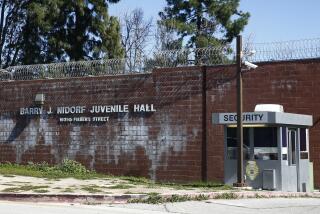Could Have Made $500,000 in Interest on Drug Assets : U.S. Fails to Capitalize on Seized Funds
WASHINGTON — Poor management and inadequate accounting cost the government more than $500,000 in interest on cash seized by federal agents in drug arrests last year and prevented local officials from using the money to fight drug trafficking, the General Accounting Office told a Senate panel Friday.
Responding to the problem, which was first reported in The Times last month, the Justice Department announced new guidelines to speed the process of depositing money seized by federal agents into government accounts.
“The absence of proper management oversight by the proper agencies is startling,” said Sen. Lawton Chiles (D-Fla.), chairman of the Senate Governmental Affairs subcommittee on accounting.
Millions in Vaults
The GAO, reporting the results of an audit of U.S. Customs Service offices in Los Angeles and Miami, found that millions of dollars are being kept in security vaults nationwide, earning little or no interest.
In addition, the agency found a backlog of up to five years in moving the money into special asset forfeiture funds, a delay that is forcing local law enforcement agencies to wait for money they could be using to fight narcotics trafficking.
The report represents a disturbing new problem in the Administration’s war on drugs that is increasingly frustrating local officers, notably in Southern California. Delays in distributing seized assets undercut a key element of the campaign--stronger cooperation between federal and local officials.
“This is a problem crying out for some sort of management solution,” said Chiles, who called for the GAO audit. “We’re not talking about petty cash. We’re talking about hundreds of millions of dollars.”
GAO Associate Director Gene L. Dodaro declined to estimate how much money is stored in vaults around the country, but said the Customs Service and the Drug Enforcement Administration had $220 million in cash on hand last year.
Studied Cases in Two Cities
The GAO restricted its study to 129 cases in two cities, Los Angeles and Miami, where more than half of the nation’s narcotics assets were seized before 1986. In 107 of those cases, the agency said, there were “unnecessary delays” in depositing cash into asset forfeiture funds or interest-bearing commercial bank accounts. The delays ranged from two days to five years.
In 21 Los Angeles cases, totaling $6.5 million, money forfeited to the government was not deposited promptly. The government could have earned $518,849 had the money in Los Angeles and Miami been deposited in high-interest U.S. Treasury accounts.
Dodaro blamed the delays on “poor internal controls.” He said customs officials do not keep adequate inventory of the cash or follow through on agency directives.
“Neither Miami nor Los Angeles had readily available inventory information which would allow personnel to know how much cash was on hand or to routinely monitor and follow up on cash seizure cases,” Dodaro said. “There has been a lack of policy and clear line of responsibility for seized cash management.”
Local Police Get Funds
Under the Comprehensive Crime Control Act of 1984, local police departments can receive up to 90% of the money or property they helped seize in drug raids involving federal investigation or prosecution.
James Knapp, deputy associate attorney general, told the committee that the Justice Department sent out a new order Friday directing the DEA, FBI and U.S. attorneys general to put all cash in a U.S. marshal’s seized assets account within 60 days after it is received or 10 days after an indictment.
Only “unique” cash--that which has fingerprints or narcotics residue on it--could be saved for evidence. Cash seized incidentally in raids would be deposited immediately.
More to Read
Sign up for Essential California
The most important California stories and recommendations in your inbox every morning.
You may occasionally receive promotional content from the Los Angeles Times.










